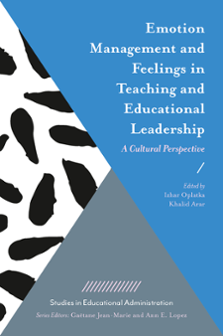
Index
Emotion Management and Feelings in Teaching and Educational Leadership
ISBN: 978-1-78756-011-6, eISBN: 978-1-78756-010-9
Publication date: 28 May 2019
Citation
(2019), "Index", Oplatka, I. and Arar, K. (Ed.) Emotion Management and Feelings in Teaching and Educational Leadership (Studies in Educational Administration), Emerald Publishing Limited, Leeds, pp. 277-286. https://doi.org/10.1108/978-1-78756-010-920191007
Publisher
:Emerald Publishing Limited
Copyright © 2019, Selection, Editorial Matter, and Introduction Izhar Opkatka and Khalid Arar
INDEX
- Prelims
- Introduction
- Section I: Culture and Context in the Study of Emotion in Education
- Chapter 1 A Call to Study Educator Emotion as a Contextualised Phenomenon
- Chapter 2 Organising in Schools: It’s All About Emotion
- Section II: Educational Management and Emotion in Different Cultural Arenas
- Chapter 3 Exploring Emotion Management Strategies of Junior High School Teachers in Shanghai, China
- Chapter 4 A Female School Leader and Emotional Management: Coping in ‘Special Measures’ in a Secondary School in England
- Chapter 5 A Restorative Approach to Valuing Emotion Management in Educational Leadership: The Case of Liberians and Palestinian Arabs in Israel
- Chapter 6 Emotion Expression Among Arab Deputy-Principals in Israel: The Key Role of the Local Culture
- Chapter 7 Muslim Women Mobilising Emotionality
- Chapter 8 Factors Affecting Emotional Management in Highly Complex Schools: The Case of Two Spanish Schools
- Section III: Cross-cultural Understandings of Educators’ Feelings and Emotions
- Chapter 9 New Principals’ Emotions: Interactions with ‘Inherited’ School Cultures
- Chapter 10 There is Always Light at the End of the Tunnel: Emotions of a Turkish School Leader in a Temporary Education Center for Syrian Children
- Chapter 11 The Effects of Shame in School Leadership: The Case of Turkish Principals
- Chapter 12 Building Teachers’ Trust in Principals and Colleagues: A Study of Critical Incidents in Chilean Schools
- Chapter 13 Understanding Willpower and Its Role in Leadership: A Study on How Educational Leaders from Different Multicultural Backgrounds Perceive Willpower
- Index